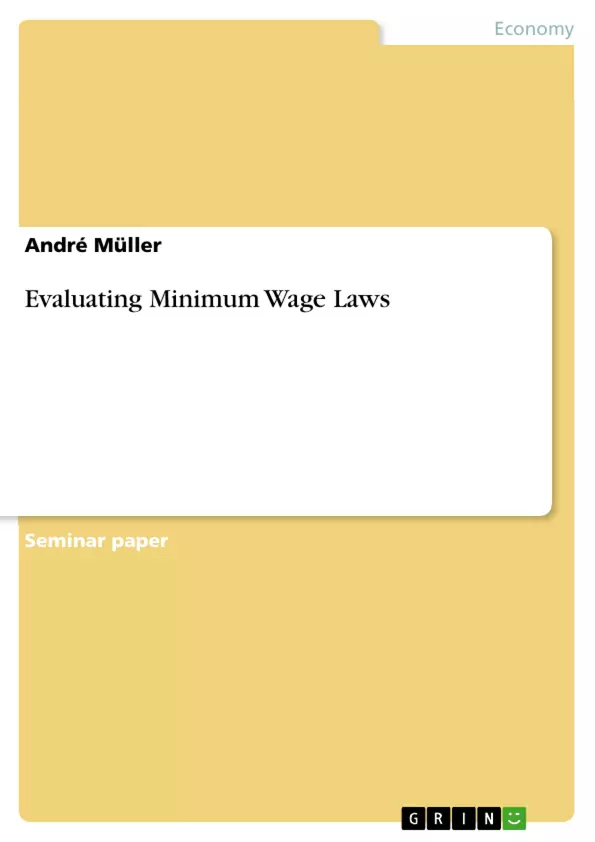The present paper aims at evaluating minimum wage laws. In order to reflect the topic, two countries – Germany and the United Kingdom –, which have already introduced minimum wages, are chosen as examples. Furthermore, the paper examines minimum wages from the perspective of two different economic theories on government intervention by introducing the neoclassical and the Keynesian approach. It investigates the observed actual impact and effectiveness of minimum wage legislation against the presented market theories as well as against the objectives and expectations raised by the legislation. Finally, the student paper gives a recommendation whether the introduction of minimum wages is actually worthwhile or not.
The paper starts with a definition of the problem and introduces objectives as well as current relevance of the topic. Subsequently, the theoretical background is reflected. This includes the definition of the term minimum wage as well as presenting the neoclassical and the Keynesian economic theory. Chapter two finally ends with a short summary. Afterwards, the paper continues with Chapter three, which describes the minimum wage concepts of Germany and the United Kingdom.
Therefore, the implementation track records explain the history, structure and the scope of the different minimum wage concepts. The critical discussion in chapter four finally evaluates the observed actual impact and effectiveness of minimum wages against the economic theories. Furthermore, it reflects the expectations and objectives which are raised by the government. The paper concludes with a summary and an outlook.
Inhaltsverzeichnis (Table of Contents)
- Introduction
- Problem definition
- Objectives
- Structure of the paper
- Theoretical background
- Definition of the term minimum wage
- Minimum wage in the neoclassical macroeconomic theory
- Minimum wage in the Keynesian macroeconomic theory
- Summary
- Minimum wage laws in Germany and the United Kingdom
- Minimum wages in Germany
- History
- Structure
- Coverage
- Minimum wages in the United Kingdom
- History
- Structure
- Coverage
- Critical discussion
- Summary and outlook
Zielsetzung und Themenschwerpunkte (Objectives and Key Themes)
This paper aims to evaluate minimum wage laws, specifically focusing on the examples of Germany and the United Kingdom. The paper examines minimum wages through the lens of two economic theories—neoclassical and Keynesian—that address government intervention. It investigates the actual impact and effectiveness of minimum wage legislation in relation to these theoretical perspectives, as well as the objectives and expectations set by the legislation itself. The paper concludes by offering a recommendation on whether the introduction of minimum wages is worthwhile.
- The impact and effectiveness of minimum wage laws
- The application of neoclassical and Keynesian economic theories to minimum wage legislation
- The historical development and structure of minimum wage laws in Germany and the United Kingdom
- The coverage and implementation of minimum wage laws in both countries
- The debate surrounding the potential benefits and drawbacks of minimum wages
Zusammenfassung der Kapitel (Chapter Summaries)
- Introduction: This chapter introduces the topic of minimum wage laws, highlighting the global trend of implementing such laws and the diverse objectives pursued by different governments. It emphasizes the ongoing controversy surrounding minimum wages, presenting arguments both for and against their effectiveness. The chapter concludes by highlighting the need for empirical evidence regarding the real impact of minimum wages.
- Theoretical background: This chapter defines the term "minimum wage" and explores two contrasting economic theories that address government intervention—neoclassical and Keynesian—in relation to minimum wages. It examines the theoretical arguments presented by each school of thought, analyzing their perspectives on the potential effects of minimum wages on labor markets.
- Minimum wage laws in Germany and the United Kingdom: This chapter delves into the specific details of minimum wage laws in two countries—Germany and the United Kingdom—that have implemented them. It examines the historical development of minimum wage legislation in both countries, highlighting key milestones and changes over time. Additionally, it explores the structure and coverage of these laws, including details about their implementation and impact on various sectors and industries.
Schlüsselwörter (Keywords)
This paper explores the complex issue of minimum wage laws, encompassing topics like labor economics, macroeconomic theory, government intervention, and social policy. Key concepts and themes include neoclassical and Keynesian economics, wage determination, labor demand and supply, unemployment, income inequality, and the impact of government regulations on the labor market. It specifically examines the implementation of minimum wage laws in Germany and the United Kingdom, focusing on their history, structure, coverage, and potential effects on economic outcomes.
Frequently Asked Questions
What is the neoclassical view on minimum wages?
Neoclassical theory generally argues that minimum wages can lead to higher unemployment because they set labor costs above the market equilibrium, reducing the demand for labor.
How does Keynesian theory approach minimum wage laws?
Keynesian theory suggests that minimum wages can boost economic growth by increasing the purchasing power of low-income workers, which in turn stimulates aggregate demand.
What are the main differences between minimum wage laws in Germany and the UK?
While both countries have national minimum wages, they differ in their historical development, the structure of the setting commissions, and the specific coverage or exemptions for certain age groups.
Do minimum wage laws effectively reduce poverty?
The effectiveness is debated; while it raises hourly pay for some, the overall impact on poverty depends on factors like employment levels, hours worked, and family composition.
What are the common objectives of government minimum wage legislation?
Governments typically aim to ensure fair pay, reduce income inequality, protect vulnerable workers, and reduce the need for state-funded social benefits.
- Quote paper
- André Müller (Author), 2020, Evaluating Minimum Wage Laws, Munich, GRIN Verlag, https://www.grin.com/document/903343



